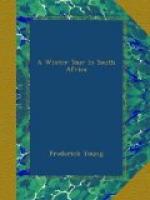Bishop. I had already heard that Grahamstown
was noted for its natural charms, and its appearance
certainly did not disappoint me. Beautiful in
situation, it merits the high praises which have been
bestowed upon it. It has also acquired a reputation
for being the seat of learning, and the centre of the
principal educational establishments of the Colony.
The Bishop having kindly provided me with a carriage,
I drove to see the various objects of interest in
the neighbourhood. I first went to the Botanical
Gardens, which are very striking. They contain
a large collection of rare and valuable specimens
of both arboriculture and horticulture. They are
admirably kept, and are very ornamental. I next
drove round the Mountain road. This is a beautiful
drive of seven miles back into the town. The
views of the surrounding country are superb. It
is a priceless boon to the inhabitants of Grahamstown
to possess such an attractive and health-giving spot,
for their recreation and enjoyment. I afterwards
visited the Museum, where there is a most interesting
and valuable collection of animal, vegetable, and
mineral curiosities, both ancient and modern.
I also went over the Prison, and recorded in the visitors’
book my favourable opinion of the arrangements made
for the health and comfort of the prisoners.
They appeared to me to be all that could reasonably
be expected, or desired. I also went to see the
Kafir school, carried on under the careful management
of the Rev. Mr. and Mrs. M——.
I regretted that time did not permit of my visiting
the celebrated Ostrich Farm of Mr. Arthur Douglass,
at Heatherton Towers, about fifteen miles from Grahamstown.
Mr. Douglass has the largest and most successful Ostrich
Farm in the Colony, in addition to which he is the
patentee of an egg hatching machine, or incubator,
which is very much used in various parts of South
Africa. The export of feathers has increased
rapidly, and has become one of the chief exports of
the Colony, as whilst in 1868 the quantity exported
was valued at L70,000, in 1887 it had reached the
value of L365,587. This is by no means the largest
amount appearing under the head of exports during recent
years, as in 1882 the value of feathers exported was
L1,093,989. It is estimated that during the past
half-century the total weight of the feathers exported
has been more than one thousand tons. The Cape
Colony has, in fact, had a monopoly of the ostrich
industry, but in 1884 several shipments of ostriches
took place to South Australia, the Argentine Republic,
and to California, and the Government of the Cape
Colony, being alarmed, that the Colony was in danger
of losing its lucrative monopoly, imposed an export
tax of L100 on each ostrich, and L5 on each ostrich
egg exported.
[Illustration: Decorative]
PORT ELIZABETH TO CAPE TOWN.




